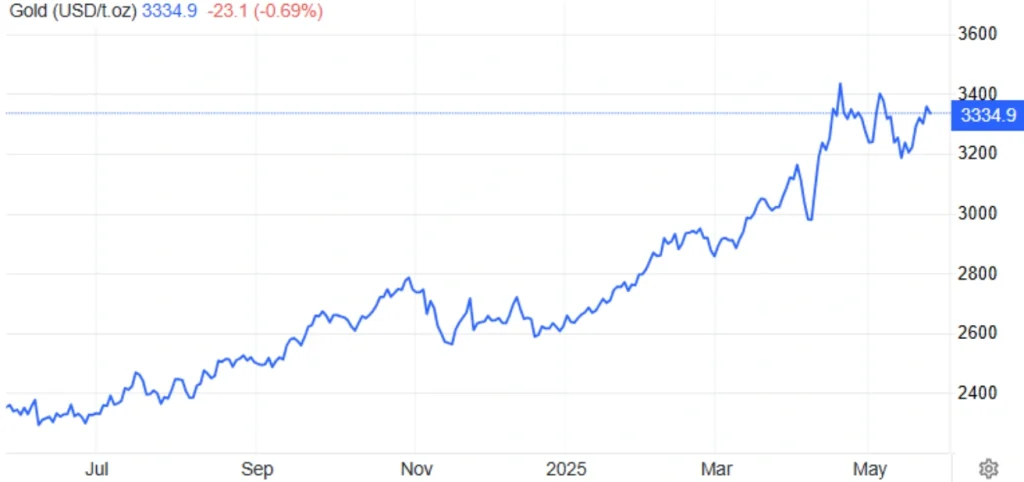
Gold Price Falls Below $3,340
Gold prices fell below $3,340 per ounce on Monday after former U.S. President Donald Trump announced a delay in the planned 50% tariff on European goods until July 9. This decision eased immediate market concerns and reduced gold’s appeal as a safe-haven asset. Just last week, gold had surged nearly 5% amid tariff uncertainty and concerns over the U.S. fiscal outlook.
Gold Price Details – Monday, May 27, 2025
| Asset | Approx. Price (USD) | Daily Change |
|---|---|---|
| Gold (1 oz) | ▼ Below $3,340 | Mild daily drop |
| Weekly Change | ▲ ~5% | Driven by tariff concerns |
Why is Gold Considered a Safe-Haven Asset?
Gold is widely recognized as a hedge against inflation and a safe-haven asset. In times of geopolitical tension, economic instability, or high inflation, investors often turn to gold to preserve capital and reduce risk exposure.
🔍 Key Drivers of Gold Prices:
- Interest rates and central bank policies
- Geopolitical and trade-related risks
- U.S. fiscal outlook and dollar strength
- Physical and investment demand (ETFs, central banks, jewelry markets)

Analyzing Trump’s Decision and Its Impact on Gold & the U.S. Economy
Trump’s decision to postpone a 50% tariff on European goods temporarily calmed market fears, leading to a decline in gold demand. However, tensions remain high as he also threatened a 25% tariff on Apple products if not manufactured domestically, keeping trade friction with both Europe and China alive.
Last week’s rally in gold was largely driven by trade uncertainty and growing anxiety over America’s fiscal health. A newly proposed tax reform plan — recently passed by the House and awaiting Senate approval — could increase the U.S. budget deficit by $3 trillion over the next decade, a factor that may provide long-term support for gold prices.
Read More:Exploring Alternative Investments: Gold, Crypto & Beyond
Summary: Opportunities & Risks Ahead
🔹 Opportunities:
- If trade talks with Europe collapse, gold may see another bullish run.
- Long-term U.S. budget concerns could drive safe-haven demand.
- Gold remains one of the most attractive assets during inflationary or recessionary periods.
🔸 Risks:
- Easing geopolitical tensions or successful trade deals could pressure gold downward.
- Fed rate hikes increase the opportunity cost of holding gold, potentially reducing demand.
- Risk-on sentiment may shift investor interest toward higher-yield assets.
Final Thoughts
Although Trump’s tariff delay led to a temporary correction in gold prices, ongoing uncertainty in U.S. fiscal and trade policy continues to support gold’s safe-haven role in the medium term.
Smart strategy: View gold as part of a balanced portfolio — not a guaranteed winner, but a resilient shield in volatile markets.
Share
Hot topics

Best broker for gold trading
There’s always been a certain magic about gold. Before online charts and trading applications, people stored their wealth in coins and bars, trusting that gold would retain its value during...
Read more




Submit comment
Your email address will not be published. Required fields are marked *